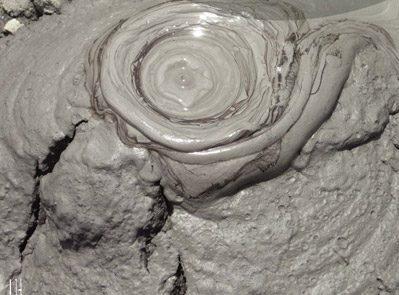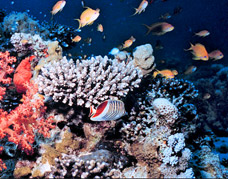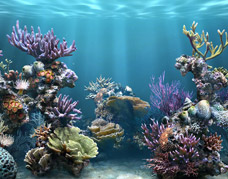| Research Themes > Coastal Ecosystems & Climate change |
Paleoclimate Research
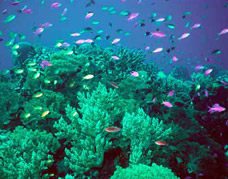 |
Coral reefs
Reefs are threatened mainly by anthropogenic eutrophication and exploitation of resources including tourism. Results obtained by numerical models and laboratory experiments globally, suggest that the increasing concentration of carbon dioxide (CO2) in the atmosphere will reduce the coral growth significantly within the next 100 years because it acidifies and thereby lowers the carbonate (aragonite and calcite) saturation state of the seawater. |
In many places worldwide it could be shown that corals use the anthropogenically emitted CO2, to build up their calcareous skeletons revealed by a specific carbon isotopic signature. Due to the rising CO2 levels in the atmosphere an enhanced uptake of anthropogenic carbon by corals, indicates an increasing human impact even in pristine and well-protected reefs during the last 50 years. |
|
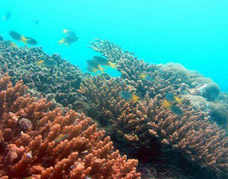 |
Although it has so far not been proven, we strongly assume that the corals around the Andaman Islands are like those in other pristine and well-protected reefs are influenced by the increasing CO2 concentration in the atmosphere. It is important to prove this hypothesis and therefore it is essential to study the response of the corals to the increasing CO2 concentration in the atmosphere. In order to investigate global impacts on the reefs around the Andaman Islands we have set up a program in which CO2 concentration in reefs, and the carbonate saturation state will be monitored and |
linked to calcification rates of selected coral species. Calcification rates can be determined by chamber experiments and samples taken from the corals, which allow determining the annual increments. This research effort will be the first of its kind in India to link coral growth limitation to climate change for effective management solution of the reefs in the future. |
|
|
|
|
